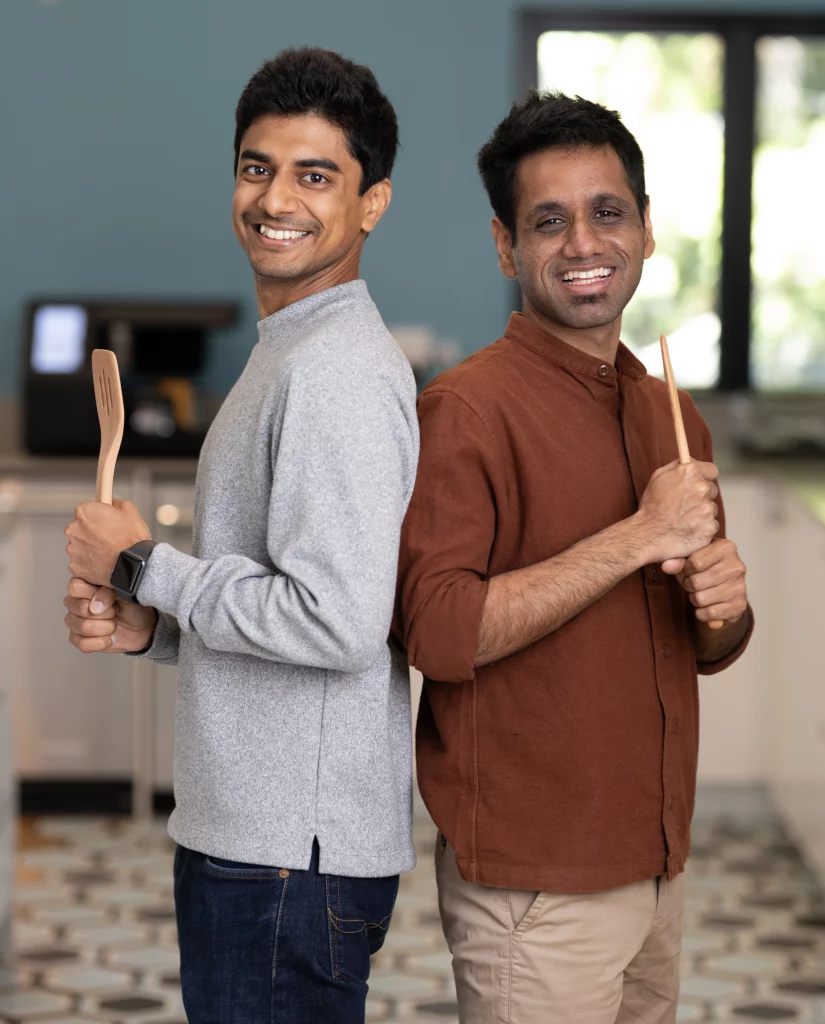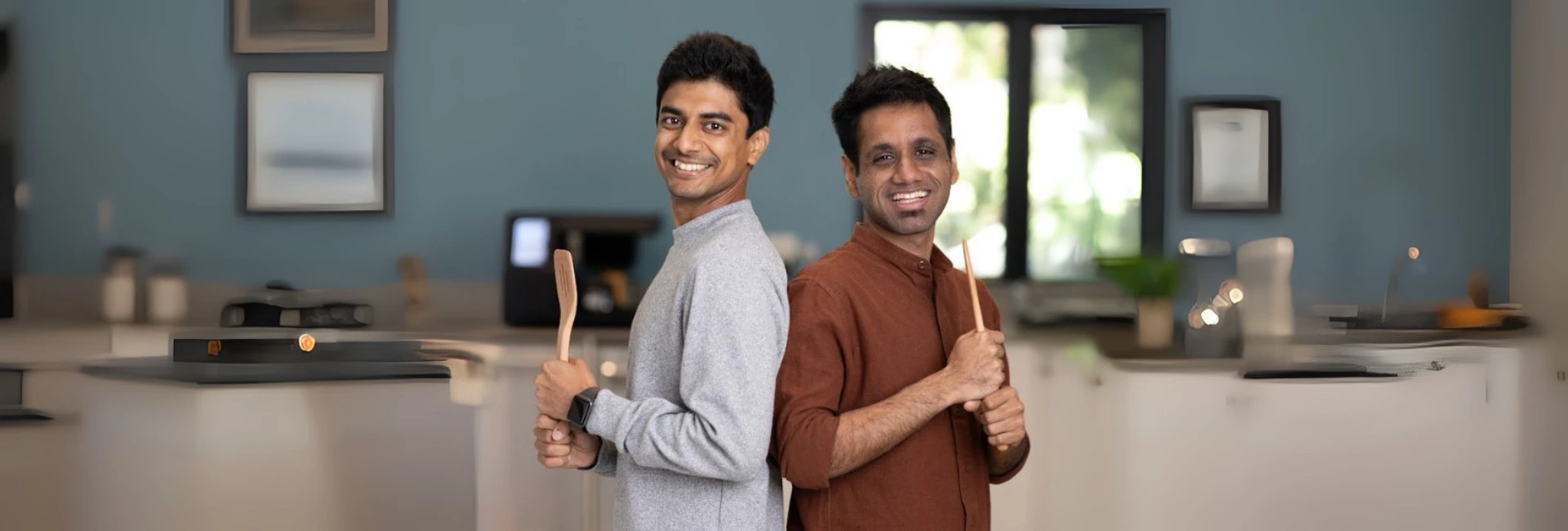(September 21, 2025) Imagine a kitchen where the hectic scramble to prepare fresh, healthy meals simply fades away. Picture walking in after a long day, choosing a recipe on a sleek countertop device, adding some fresh ingredients, and pressing ‘cook’. The aroma of a homemade meal, crafted with the finesse of a professional chef, fills your home, all without you having to lift a finger during the cooking process.
This is Posha: your family’s private chef, a groundbreaking AI-powered countertop cooking robot that is transforming home kitchens, envisioned by two young Indian entrepreneurs, Raghav Gupta and Rohin Malhotra. Based in San Francisco with a development center in Bangalore, Posha embodies the spirit of global innovation, blending the best of technology and culinary heritage.
View this post on Instagram
Roots of innovation
Raghav, the co-Founder and CEO of Posha, grew up in a loving and hardworking household in New Delhi. His father ran a food grain business, which meant that food was a natural part of family conversations, embedding deep culinary sensibilities in him from an early age. “My parents encouraged me to read voraciously. My father would take me to a public library almost every week on his two-wheeler, and I’d come home with a fresh stack of books,” Raghav recalls. This nurturing environment combined a love of food and a curiosity for technology, sowing the seeds for what would eventually become Posha.
Rohin, co-founder alongside Raghav, also grew up in New Delhi in a household where both parents were professionals. “Since both of them were busy, I learned to be independent very early. I figured out how to do my homework by myself, I learned to cook, and I rarely relied on my parents for schoolwork,” he shares. Witnessing his mother juggle work and household responsibilities, Rohin developed empathy for the time-consuming nature of cooking. “My dad instilled in me from a young age that I should build something of my own,” he adds, which strongly shaped his entrepreneurial mindset.
Friends since their teenage years, they shared an early goal: to create something meaningful that solved a personal problem they both knew well.

Raghav Gupta (left) and Rohin Malhotra
From early experiences to Posha’s birth
Before founding Posha, both entrepreneurs gathered valuable experience that shaped their approach. Raghav interned at his father’s food grain business, learning grit and ownership, and later at Siemens, where he developed discipline and an appreciation for structured processes. “Together, they gave me a balanced view of entrepreneurship and helped me appreciate both the hustle and the process. These are the lessons I carry into Posha every day,” he notes.
Rohin interned with Greenway Appliances and Auroville Wind Energy Systems, gaining exposure to building user-centric products and global perspectives on technology and energy. This diverse background helped him understand the importance of empathy in product design, an attribute strongly reflected in Posha’s philosophy.
Posha: The private chef for every kitchen
Posha is often dubbed a “coffee machine for food,” a simple yet profound analogy that Raghav uses to describe the product’s ease of use. “You pick a recipe, add fresh ingredients, press ‘cook,’ and Posha does the rest: adding ingredients, stirring, cooking, all perfectly timed using AI and computer vision to mimic a chef’s instincts,” he explains.
The device, designed to fit seamlessly on your kitchen countertop, combines artificial intelligence, computer vision, robotics, and culinary science. It features an induction cooktop, detachable pan, automated stirrer, and containers for spices and ingredients. Posha monitors cooking stages with its built-in camera, manages heat precisely, and continually adjusts based on the food’s consistency and color, just like a chef watching over a dish.
“Our vision was to build a world where people never had to choose between pursuing their careers and serving their families healthy, freshly cooked meals,” says Rohin. Initially focused on building the best cooking robot, the company has now expanded its horizon to becoming a smart kitchen assistant that also plans meals, shops for groceries, and even creates new recipes using generative AI. With hundreds of units shipped so far and thousands more waiting, this dream is rapidly becoming reality.
View this post on Instagram
Overcoming challenges on the frontier of deep tech
Building Posha was no small feat. “This was one of the most interdisciplinary problems you could imagine, combining software, AI, mechanical engineering, electronics, culinary science, supply chain, and manufacturing,” Raghav says. Assembling a team that could effectively collaborate across these diverse disciplines and scale the product from prototype to manufacturable appliance was among the hardest hurdles.
Rohin echoes this complexity, highlighting the rigorous attention to user needs gleaned from early experiences with appliance and energy startups. The founders put a premium on food safety and hygiene, ensuring every part of Posha that touches food is dishwasher-safe. Posha’s reliability is bolstered by meticulous data collection, allowing the team to pre-emptively fix issues before scaling deliveries—a process reminiscent of methods used in self-driving cars.
“It’s about building the right processes and hiring the right people, which empowers us to balance long-term vision with the demands of short-term execution,” Raghav remarks.
The exciting road ahead
What excites the founders most about Posha’s future are the new possibilities unlocked by generative AI. “Soon, you’ll be able to say, ‘Give me a Thai recipe with tofu, no coconut, at least 5g protein, under 1g fiber, no peanuts, ready in 30 minutes,’ and Posha will generate a delicious, entirely new recipe that meets those constraints, and cook it perfectly on the first try,” Raghav reveals.
With $8 million raised in funding, the company’s immediate focus is improving reliability and user experience to scale production and meet high demand. Their strategy to go mainstream is to make early adopters extremely happy so that they naturally spread the word, an approach proving successful as the product is currently supply-constrained, not demand-constrained.
While currently focused on the US market, Posha aims to create a versatile product adaptable to kitchens globally. “We stay as close to our users as possible,” Raghav explains. The team provides hands-on support through WhatsApp instead of impersonal ticketing systems, gaining direct feedback on how people use Posha and iterating accordingly. This ensures a truly universal and user-friendly solution.
View this post on Instagram
Beyond work
When not pushing the boundaries of kitchen robotics, both Raghav and Rohin embrace other passions that keep them grounded. “I love cooking (unsurprisingly!), trying new restaurants, and playing board games like poker, Catan, and Root,” shares Raghav. Music also features prominently in his life; he is a huge fan of the Grateful Dead and John Mayer. Recently, strength training has become a favorite way for him to stay healthy and clear his mind.
Rohin, meanwhile, is an avid reader and sports enthusiast. He loves long-distance running and plays tennis, pickleball, soccer, and cricket. “Being a big foodie, I also love exploring new places to eat,” he adds.
Reimagining the way we cook
Raghav Gupta and Rohin Malhotra’s journey from childhood friends in New Delhi to co-founders of Posha exemplifies how deep personal experiences and a shared vision can lead to innovation that impacts lives worldwide. Through their AI-powered kitchen robot, apart from building a product; they are nurturing a future where busy professionals and families no longer sacrifice health or time to enjoy fresh, homemade meals.
As Raghav aptly puts it, “Patience and persistence are everything. If you keep listening to your users, assembling the right team, and iterating relentlessly, you build something truly transformative.”
Indeed, with Posha, the future of home cooking is here. And it looks delicious.
- Follow Raghav Gupta and Rohin Malhotra on Linkedin
ALSO READ: Swathi Nelabhatla: Pioneering women’s place in the gig economy across India and the U.S.



